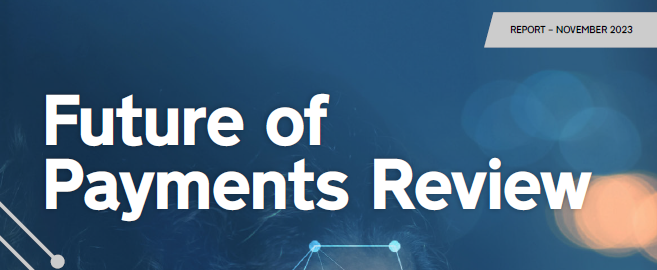Published on 7th December 2023
The report of the Joe Garner review into the Future of Payments has been published.
You can download the report here
It is testament to severe problems in UK payments:
- Card fees experienced by merchants are far higher than the cap supposedly imposed by the Interchange Fee Regulation
- Authorised Push Payment Fraud (APPF) is not solved
- The bank transfer process is both insecure and ‘clunky’, because payers have to enter the payee’s bank details – but is this reason enough to force through universal eID?
The repeated claim that UK payments are secure and reliable is undermined by reality:
- Losses to APPF
- Multi-hour outage of the new high-value payments system (RTGS Renewal) just weeks after it adopted the ISO20022 XML message format onto which BACS and Faster Payments are also to be migrated
The report/review are an implicit indictment of the Payment Systems Regulator:
- Failure to properly police the Interchange Fee Regulation
- Failure to solve APPF
- Failure to deliver a viable vision from its Payment Strategy exercise 2015-7
The report/review have some severe weaknesses:
- It granted privileged access to the digital payments industry to put and reinforce its case
- It drew most of the data referenced in its report from the ‘industry’
- Despite concluding that the PSR’s Payment Strategy was not viable, it has accepted a number of hand-me-down initiatives from it
- The adoption of the ISO20022 XML data format is not challenged, despite the multi-hour outage of RTGS Renewal shortly after the go-live with ISO20022 XML
- In excluding non-digital payments means from consideration it has:
- Overlooked that there are two perfectly viable payment means where the payer does not have to know the payee’s bank details – cash and cheque
- Forced itself to contemplate only a digital solution to bank transfers being ‘clunky’, and it is a sledgehammer to crack a nut – eID
- Submerged the weaknesses of digital payment means in the areas of cost, speed, convenience and security/reliability: digital payment means are worse for users than non-digital ones, but better for the ‘industry’
- It invests major responsibility for improving the future in Open Banking, an initiative that is in its infancy and which the review does not subject to robust scrutiny
The report declares ‘full steam ahead’ for digital payments with Open Banking in the vanguard.
This approach is not supported by the contents of the report/review and three workstreams need to be taken in hand before the report’s recommendations are acted upon:
- Card fees – legal examination of the validity of the charging of fees with different names than ‘interchange fee’ when the wording of the preamble to the EU Interchange Fee Regulation uses that term as a catch-all for any and all deductions-from-face-value, meaning that the interchange fee is the only cost that can fall on a merchant other than the remuneration paid to the acquirer under the contract between the merchant and their acquirer
- APPF – operational/legal review of the interplay between the Faster Payments process and technical message specifications, the 2017 Payment Services Regulations, existing case law, and the upshot that payers must state the beneficiary name but payment service providers do not have to check or process it
- Open Banking – rigorous verification of Open Banking’s statistics on its supposed success

